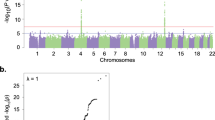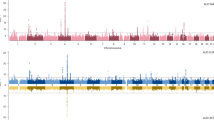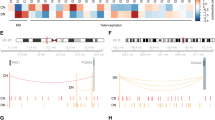Abstract
To identify novel traits associated with alleles known to predispose to alcohol and nicotine use, we conducted a phenome-wide association study (PheWAS) in a large multi-population cohort. We investigated 7688 African-Americans, 1133 Asian-Americans, 14 081 European-Americans, and 3492 Hispanic-Americans from the Women’s Health Initiative, analyzing alleles at the CHRNA3–CHRNA5 locus, ADH1B, and ALDH2 with respect to phenotypic traits related to anthropometric characteristics, dietary habits, social status, psychological traits, reproductive history, health conditions, and nicotine/alcohol use. In ADH1B trans-population meta-analysis and population-specific analysis, we replicated prior associations with drinking behaviors and identified multiple novel phenome-wide significant and suggestive findings related to psychological traits, socioeconomic status, vascular/metabolic conditions, and reproductive health. We then applied Bayesian network learning algorithms to provide insight into the causative relationships of the novel ADH1B associations: ADH1B appears to affect phenotypic traits via both alcohol-mediated and alcohol-independent effects. In an independent sample of 2379 subjects, we also replicated the novel ADH1B associations related to socioeconomic status (household gross income and highest grade finished in school). For CHRNA3–CHRNA5 risk alleles, we replicated association with smoking behaviors, lung cancer, and asthma. There were also novel suggestive CHRNA3–CHRNA5 findings with respect to high-cholesterol-medication use and distrustful attitude. In conclusion, the genetics of alcohol and tobacco use potentially has broader implications on physical and mental health than is currently recognized. In particular, ADH1B may be a gene relevant for the human phenome via both alcohol metabolism-related mechanisms and other alcohol metabolism-independent mechanisms.
Similar content being viewed by others
Log in or create a free account to read this content
Gain free access to this article, as well as selected content from this journal and more on nature.com
or
References
1000 Genomes Project Consortium, Auton A, Brooks LD, Durbin RM, Garrison EP, Kang HM et al (2015). A global reference for human genetic variation. Nature 526: 68–74.
Abraham G, Inouye M (2014). Fast principal component analysis of large-scale genome-wide data. PLoS One 9: e93766.
Buhler KM, Gine E, Echeverry-Alzate V, Calleja-Conde J, de Fonseca FR, Lopez-Moreno JA (2015). Common single nucleotide variants underlying drug addiction: more than a decade of research. Addict Biol 20: 845–871.
Bulik-Sullivan B, Finucane HK, Anttila V, Gusev A, Day FR, Loh PR et al (2015). An atlas of genetic correlations across human diseases and traits. Nat Genet 47: 1236–1241.
Bush WS, Oetjens MT, Crawford DC (2016). Unravelling the human genome-phenome relationship using phenome-wide association studies. Nat Rev Genet 17: 129–145.
Chen LS, Hung RJ, Baker T, Horton A, Culverhouse R, Saccone N et al (2015). CHRNA5 risk variant predicts delayed smoking cessation and earlier lung cancer diagnosis—a meta-analysis. J Natl Cancer Inst 107: pii: djv100.
Clarke TK, Smith AH, Gelernter J, Kranzler HR, Farrer LA, Hall LS et al (2015). Polygenic risk for alcohol dependence associates with alcohol consumption, cognitive function and social deprivation in a population-based cohort. Addict Biol 21: 469–480.
Cosgrove KP, Wang S, Kim SJ, McGovern E, Nabulsi N, Gao H et al (2014). Sex differences in the brain's dopamine signature of cigarette smoking. J Neurosci 34: 16851–16855.
David SP, Hamidovic A, Chen GK, Bergen AW, Wessel J, Kasberger JL et al (2012). Genome-wide meta-analyses of smoking behaviors in African Americans. Transl Psychiatry 2: e119.
Delaneau O, Marchini J, Zagury JF (2012). A linear complexity phasing method for thousands of genomes. Nat Methods 9: 179–181.
Denny JC, Bastarache L, Ritchie MD, Carroll RJ, Zink R, Mosley JD et al (2013). Systematic comparison of phenome-wide association study of electronic medical record data and genome-wide association study data. Nat Biotechnol 31: 1102–1110.
Druesne-Pecollo N, Tehard B, Mallet Y, Gerber M, Norat T, Hercberg S et al (2009). Alcohol and genetic polymorphisms: effect on risk of alcohol-related cancer. Lancet Oncol 10: 173–180.
Drug Therapeutics Bulletin (2014). Republished: Nicotine and health. BMJ 349: 2014 2017 0264rep.
Edenberg HJ (2007). The genetics of alcohol metabolism: role of alcohol dehydrogenase and aldehyde dehydrogenase variants. Alcohol Res Health 30: 5–13.
Forey BA, Fry JS, Lee PN, Thornton AJ, Coombs KJ (2013). The effect of quitting smoking on HDL-cholesterol - a review based on within-subject changes. Biomark Res 1: 26.
Gage SH, Davey Smith G, Ware JJ, Flint J, Munafo MR (2016). G = E: what GWAS can tell us about the environment. PLoS Genet 12: e1005765.
Galinsky KJ, Bhatia G, Loh PR, Georgiev S, Mukherjee S, Patterson NJ et al (2016). Fast principal-component analysis reveals convergent evolution of ADH1B in Europe and East Asia. Am J Hum Genet 98: 456–472.
Gelernter J, Kranzler HR, Sherva R, Almasy L, Herman AI, Koesterer R et al (2015). Genome-wide association study of nicotine dependence in American populations: identification of novel risk loci in both African-Americans and European-Americans. Biol Psychiatry 77: 493–503.
Gelernter J, Kranzler HR, Sherva R, Almasy L, Koesterer R, Smith AH et al (2014). Genome-wide association study of alcohol dependence:significant findings in African- and European-Americans including novel risk loci. Mol Psychiatry 19: 41–49.
Gravel S, Zakharia F, Moreno-Estrada A, Byrnes JK, Muzzio M, Rodriguez-Flores JL et al (2013). Reconstructing Native American migrations from whole-genome and whole-exome data. PLoS Genet 9: e1004023.
Guo R, Ren J (2010). Alcohol and acetaldehyde in public health: from marvel to menace. Int J Environ Res Public Health 7: 1285–1301.
Haavik J, Blau N, Thony B (2008). Mutations in human monoamine-related neurotransmitter pathway genes. Hum Mutat 29: 891–902.
Hallden S, Sjogren M, Hedblad B, Engstrom G, Hamrefors V, Manjer J et al (2015). Gene variance in the nicotinic receptor cluster (CHRNA5-CHRNA3-CHRNB4) predicts death from cardiopulmonary disease and cancer in smokers. J Intern Med 279: 388–398.
Hart AB, Lynch KG, Farrer L, Gelernter J, Kranzler HR (e-pub ahead pf print 1 April 2015). Which alcohol use disorder criteria contribute to the association of ADH1B with alcohol dependence? Addict Biol.
Holmes MV, Dale CE, Zuccolo L, Silverwood RJ, Guo Y, Ye Z et al (2014). Association between alcohol and cardiovascular disease: Mendelian randomisation analysis based on individual participant data. BMJ 349: g4164.
Howie B, Marchini J, Stephens M (2011). Genotype imputation with thousands of genomes. G3 (Bethesda) 1: 457–470.
Hutter CM, Young AM, Ochs-Balcom HM, Carty CL, Wang T, Chen CT et al (2011). Replication of breast cancer GWAS susceptibility loci in the Women's Health Initiative African American SHARe Study. Cancer Epidemiol Biomarkers Prev 20: 1950–1959.
Ibanez MI, Camacho L, Mezquita L, Villa H, Moya-Higueras J, Ortet G (2015). Alcohol expectancies mediate and moderate the associations between big five personality traits and adolescent alcohol consumption and alcohol-related problems. Front Psychol 6: 1838.
Jensen KP, DeVito EE, Herman AI, Valentine GW, Gelernter J, Sofuoglu M (2015). A CHRNA5 smoking risk variant decreases the aversive effects of nicotine in humans. Neuropsychopharmacology 40: 2813–2821.
Kocarnik JM, Park SL, Han J, Dumitrescu L, Cheng I, Wilkens LR et al (2015). Pleiotropic and sex-specific effects of cancer GWAS SNPs on melanoma risk in the population architecture using genomics and epidemiology (PAGE) study. PLoS One 10: e0120491.
Latvala A, Rose RJ, Pulkkinen L, Dick DM, Korhonen T, Kaprio J (2014). Drinking, smoking, and educational achievement: cross-lagged associations from adolescence to adulthood. Drug Alcohol Depend 137: 106–113.
Li D, Zhao H, Gelernter J (2011). Strong association of the alcohol dehydrogenase 1B gene (ADH1B) with alcohol dependence and alcohol-induced medical diseases. Biol Psychiatry 70: 504–512.
Li D, Zhao H, Gelernter J (2012). Strong protective effect of the aldehyde dehydrogenase gene (ALDH2) 504lys (*2) allele against alcoholism and alcohol-induced medical diseases in Asians. Hum Genet 131: 725–737.
Morozova M, Rabin RA, George TP (2015). Co-morbid tobacco use disorder and depression: A re-evaluation of smoking cessation therapy in depressed smokers. Am J Addict 24: 687–694.
Obasi EM, Brooks JJ, Cavanagh L (2015). The relationship between psychological distress, negative cognitions, and expectancies on problem drinking: exploring a growing problem among university students. Behav Modif 40: 51–69.
Pandeya N, Olsen CM, Whiteman DC (2013). Sex differences in the proportion of esophageal squamous cell carcinoma cases attributable to tobacco smoking and alcohol consumption. Cancer Epidemiol 37: 579–584.
Peng GS, Chen YC, Wang MF, Lai CL, Yin SJ (2014). ALDH2*2 but not ADH1B*2 is a causative variant gene allele for Asian alcohol flushing after a low-dose challenge: correlation of the pharmacokinetic and pharmacodynamic findings. Pharmacogenet Genomics 24: 607–617.
Picciotto MR, Kenny PJ (2013). Molecular mechanisms underlying behaviors related to nicotine addiction. Cold Spring Harb Perspect Med 3: a012112.
Polimanti R, Yang C, Zhao H, Gelernter J (2015a). Dissecting ancestry genomic background in substance dependence genome-wide association studies. Pharmacogenomics 16: 1487–1498.
Polimanti R, Zhang H, Smith AH, Zhao H, Farrer LA, Kranzler HR et al (e-pub ahead of print 12 October 2015b). Genome-wide association study of body mass index in subjects with alcohol dependence. Addict Biol.
Poonawalla IB, Kendzor DE, Owen MT, Caughy MO (2014). Family income trajectory during childhood is associated with adolescent cigarette smoking and alcohol use. Addict Behav 39: 1383–1388.
Purcell S, Neale B, Todd-Brown K, Thomas L, Ferreira MA, Bender D et al (2007). PLINK: a tool set for whole-genome association and population-based linkage analyses. Am J Hum Genet 81: 559–575.
Quillen EE, Chen XD, Almasy L, Yang F, He H, Li X et al (2014). ALDH2 is associated to alcohol dependence and is the major genetic determinant of "daily maximum drinks" in a GWAS study of an isolated rural Chinese sample. Am J Med Genet B Neuropsychiatr Genet 165B: 103–110.
Schliep KC, Zarek SM, Schisterman EF, Wactawski-Wende J, Trevisan M, Sjaarda LA et al (2015). Alcohol intake, reproductive hormones, and menstrual cycle function: a prospective cohort study. Am J Clin Nutr 102: 933–942.
Scutari M (2010). Learning Bayesian Networks with the bnlearn R Package. J Stat Softw 35: 1–22.
Sherva R, Kranzler HR, Yu Y, Logue MW, Poling J, Arias AJ et al (2010). Variation in nicotinic acetylcholine receptor genes is associated with multiple substance dependence phenotypes. Neuropsychopharmacology 35: 1921–1931.
Spencer KL, Malinowski J, Carty CL, Franceschini N, Fernandez-Rhodes L, Young A et al (2013). Genetic variation and reproductive timing: African American women from the Population Architecture using Genomics and Epidemiology (PAGE) Study. PLoS One 8: e55258.
Taylor AE, Fluharty ME, Bjorngaard JH, Gabrielsen ME, Skorpen F, Marioni RE et al (2014). Investigating the possible causal association of smoking with depression and anxiety using Mendelian randomisation meta-analysis: the CARTA consortium. BMJ Open 4: e006141.
The Tobacco and Genetics Consortium (2010). Genome-wide meta-analyses identify multiple loci associated with smoking behavior. Nat Genet 42: 441–447.
The Women's Health Initiative Study Group (1998). Design of the Women's Health Initiative clinical trial and observational study. Control Clin Trials 19: 61–109.
Torjussen TM, Lodrup Carlsen KC, Munthe-Kaas MC, Mowinckel P, Carlsen KH, Helms PJ et al (2012). Alpha-nicotinic acetylcholine receptor and tobacco smoke exposure: effects on bronchial hyperresponsiveness in children. Pediatr Allergy Immunol 23: 40–49.
Treur JL, Boomsma DI, Lubke GH, Bartels M, Vink JM (2014). The predictive value of smoking expectancy and the heritability of its accuracy. Nicotine Tob Res 16: 359–368.
Wen L, Jiang K, Yuan W, Cui W, Li MD (2016). Contribution of variants in CHRNA5/A3/B4 gene cluster on chromosome 15 to tobacco smoking: from genetic association to mechanism. Mol Neurobiol 53: 472–484.
White A, Castle IJ, Chen CM, Shirley M, Roach D, Hingson R (2015). Converging patterns of alcohol use and related outcomes among females and males in the United States, 2002 to 2012. Alcohol Clin Exp Res 39: 1712–1726.
Willer CJ, Li Y, Abecasis GR (2010). METAL: fast and efficient meta-analysis of genomewide association scans. Bioinformatics 26: 2190–2191.
Wu SH, Guo Q, Viken RJ, Reed T, Dai J (2014). Heritability of usual alcohol intoxication and hangover in male twins: the NAS-NRC Twin Registry. Alcohol Clin Exp Res 38: 2307–2313.
Xu K, Kranzler HR, Sherva R, Sartor CE, Almasy L, Koesterer R et al (2015). Genomewide association study for maximum number of alcoholic drinks in European Americans and African Americans. Alcohol Clin Exp Res 39: 1137–1147.
Acknowledgements
The publicly available data sets used for the analyses described in this manuscript were obtained from dbGaP through dbGaP accession number phs000200.v9.p3 (WHI CT and OS), phs000386.v5.p3 (WHI SHARe), and phs000227.v2.p3 (PAGE WHI). The WHI program is funded by the National Heart, Lung, and Blood Institute, National Institutes of Health, U.S. Department of Health and Human Services through contracts N01WH22110, 24152, 32100-2, 32105-6, 32108-9, 32111-13, 32115, 32118-32119, 32122, 42107-26, 42129-32, and 44221. This manuscript was not prepared in collaboration with investigators of the WHI, has not been reviewed and/or approved by the WHI, and does not necessarily reflect the opinions of the WHI investigators or the NHLBI. WHI PAGE is funded through the NHGRI PAGE network (Grant Number U01 HG004790). Assistance with phenotype harmonization, SNP selection, data cleaning, meta-analyses, data management and dissemination, and general study coordination was provided by the PAGE Coordinating Center (U01HG004801-01). Funding for WHI SHARe genotyping was provided by NHLBI Contract N02-HL-64278.
Author information
Authors and Affiliations
Corresponding author
Additional information
Supplementary Information accompanies the paper on the Neuropsychopharmacology website
Supplementary information
Rights and permissions
About this article
Cite this article
Polimanti, R., Kranzler, H. & Gelernter, J. Phenome-Wide Association Study for Alcohol and Nicotine Risk Alleles in 26394 Women. Neuropsychopharmacol 41, 2688–2696 (2016). https://doi.org/10.1038/npp.2016.72
Received:
Revised:
Accepted:
Published:
Issue date:
DOI: https://doi.org/10.1038/npp.2016.72
This article is cited by
-
Further evidence supporting a potential role for ADH1B in obesity
Scientific Reports (2021)
-
Disease associations depend on visit type: results from a visit-wide association study
BioData Mining (2019)
-
Lack of associations of the opioid receptor mu 1 (OPRM1) A118G polymorphism (rs1799971) with alcohol dependence: review and meta-analysis of retrospective controlled studies
BMC Medical Genetics (2017)
-
Current Scope and Challenges in Phenome-Wide Association Studies
Current Epidemiology Reports (2017)
-
Allergy-specific Phenome-Wide Association Study for Immunogenes in Turkish Children
Scientific Reports (2016)



